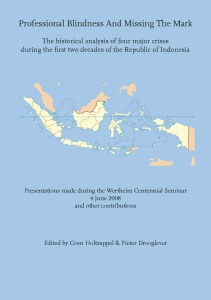Professional Blindness And Missing The Mark ~ The Historical Analysis Of Four Major Crises During The First Two Decades Of The Republic Of Indonesia
Now complete online: Professional Blindness And Missing The Mark ~ The Historical Analysis Of Four Major Crises During The First Two Decades Of The Republic Of Indonesia.
This book contains six captivating articles about decisive moments in the first two decennia of the Republic of Indonesia’s existence (1945-1965); one per chapter with an introduction. They were presented at the memorial in honor of Professor dr. Wim Wertheim’s centennial birthday in 2008 – the doyen of post-war Dutch Indonesia research.
Each chapter explores a significant event from that era and was written by experienced researchers – Mary van Delden, Saskia Wieringa, Ben White, Pieter Drooglever and Coen Holtzappel – making use of source material that for the most part has been neglected by previous research. The analyses of the material reveal the new Republic’s struggle to bring together, and keep together, the colonial heritage of the Dutch East Indies in one independent and productive Republic of Indonesia. The foundation of a domestically, across the archipelago, and internationally accepted national government, as well as obedient regional governments and obliging armed forces, were deciding factors in this struggle.
Violent confrontations between armed forces and the communist party PKI took place in 1948 during the Indonesian National Revolution, as well as in 1965 after the Republic had already been independent for 14 years. The dividing issue was the power balance between politics and army top in state, government and land. A rigorous break with the past was made in 1965, which saw the installation of a junta regime under the leadership of General Soeharto that stayed in place for the following 32 years. Democracy had to wait until the army top made sure every part of politics and armed forces was finely adapted to work with the other. Not until then would the clock of government, production and control be fully set.
The articles reveal a blind spot in Western research of Indonesian developments in the discussed period; research that from 1965 onward was further, and permanently, influenced by the Indonesian army’s view. The Cold War raged domestically as well as abroad.
CONTENTS
Coen Holtzappel – Preface
Mary van Delden – Internees from the Republic
Coen Holtzappel – The year 1948 and the Madiun affairs, a year of cheat and rumours
Pieter Drooglever – Papua Nationalism. Another blind spot
Coen Holtzappel – The Thirtieth September Movement of 1965, as viewed by the perpetrators – Part One
Coen Holtzappel – The Thirtieth September Movement of 1965, as viewed by the perpetrators – Part Two
Coen Holtzappel – The Thirtieth September Movement of 1965, as viewed by the perpetrators – Part Three
Saskia Eleonora Wieringa – Sexual Slander And The 1965/66 Mass Killings In Indonesia: Political And Methodological Considerations
Ben White – The anthropologist’s blind spot: Clifford Geertz on class, killings and communists in Indonesia
Coen Holtzappel & Pieter Drooglever – Postscript
About the authors
